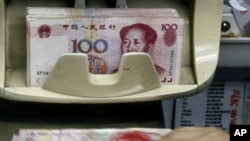U.S. Treasury Secretary Timothy Geithner is set to testify Thursday before the House Ways and Means Committee of the U.S. House of Representatives on China's alleged manipulation of its currency. The committee Wednesday heard from a number of people, including economists, on possible proposals to push Beijing to stop the manipulation. That brought responses from another group of economists.
The congressmen heard that China undervalues it's currency, the Yuan, by as much as 40 percent to give its exported goods an unfair advantage on global markets. The committee heard several suggestions of what can be done to encourage China to allow the Yuan to strengthen. One was using retaliatory duties against China under World Trade Organization rules. But, in a conference call with reporters after the congressional hearing, American Enterprise Institute economist Phillip Levy said that may not be such a good idea.
"The WTO's rules are not very clear on this point and the only way the U.S. could win such a case would be to have a creative and adventurous dispute settlement panel, the sort the US is usually against," said Phillip Levy. "And, of course, there is the persistent question that comes up by law every six months of whether China should be named a currency manipulator. It's interesting to note that there is remarkably little business support for aggressive stances on Chinese currency. This is not, by any means, because business is satisfied with China's economic practices or treatment, but when you look at thing like the American Chamber of Commerce in Shanghai's survey of businesses trying to operate in China...I believe the currency came in something like fifth in the order of their concerns...behind things like treatment of foreign investment and intellectual property protections. so, I think there is some sentiment that's been expressed in the business community that this focus on currency is really a misdirection of U.S. efforts."
Phillip Levy's colleague, economist Desmond Lachman agreed that China's currency valuation is the center of the debate, but he also said he finds there are at least two other issues of equal or greater importance.
"One is that in addition to the currency issue, there's a whole range of non-tariff restrictions that China is resorting to give itself an unfair, competitive advantage on stuff like domestic innovation, stuff of that sort that make it difficult to compete fairly with China," said Desmond Lachman. "So, it's not just the currency issue. That last point I would like to make is that beyond the currency issue, what it's really got to be looking at the imbalance with China as a problem of saving and investment, that there's an imbalance on that score as long as China is saving at a high level you're gonna have this imbalance persisting. And, we don't see much movement by China to take those measures that would boost domestic consumption that would lay the basis for bringing the global imbalances onto a sustainable path.'
Economist Desmond Lachman says the ideal policy would be for China to cooperate in hashing out a plan to reduce trade imbalances. That could be done, he says, over a reasonable period of time with China increasing the value of its currency while the United States took measures to increase its household savings rate. At the same time, Mr. Lachman says, China would have to take the measures needed to increase domestic consumption. Without working together, he says, would just lead to a train wreck in the not too distant future.
China's Currency Valuation Creates Focal Point Debate




